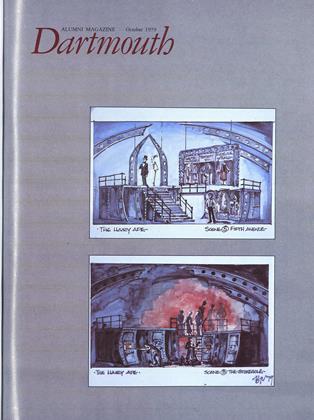Had it not been for the skirts, the coats and ties, the groups of students streaming down East Wheelock Street might have been headed for a hockey game, a basketball game, or a rock concert in Thompson Arena. But it was Convocation, marking the opening of the 210th year of the College, that had the undergraduates spruced up the way folks back home would like always to imagine them.
They flowed into Thompson, saving blocks of seats for returning friends as the rows filled quickly. Excited greetings, hurried reunions, hugs, kisses, and handshakes all around, until all rose as the president led the academic procession into the arena, the colorful figures small and distant from the back rows. Traditionally poor faculty attendance left two empty rows between gowned professors and the students in semi-formal dress, adding somehow to the ceremonious atmosphere.
Traditional artifacts made the scene familiar — the large green pennant with DARTMOUTH in big white letters hung on a curtain supported by two-by-fours to form the backdrop of a speakers' platform set up in the middle of the vast concrete floor. The lectern that looks like a tree trunk was there on the podium, along with the president, the provost, the dean, and the chaplain. The colors of the academic regalia had not changed, nor had the explanation of the pedagogical rainbow in its accustomed place on the back of the official program. To distinguish philosophers from theologians or musicians from scientists, one needed only to match the colors of the velvet trim on the front panels and sleeves of the gowns with the chart.
But some things were different this year, like what Sara Castro-Klaren had to say. Introducing her, Provost Leonard Rieser '44 commented that, to his knowledge, she was the first individual born in the southern hemisphere to address a Dartmouth convocation. Her remarks about education's role in perpetuating class distinctions, however, seemed a more original addition to Convocation than her geographical origin. And Bruce Allyn '80, the president of the new Undergraduate Council, the first attempt in ten years at student government, spoke. And, to the hisses of those assembled, President Kemeny did not begin his address with "Men and Women of Dartmouth," a standard since 1972. But he delighted everyone when he said it after a short preamble — though few seemed to notice the switch — when he addressed the class of 1983 as "Women and Men of Dartmouth."
All the speakers talked about liberal education. An emotionally appealing speech by Dean Ralph Manuel '58 created a little tension among his listeners: Some students chuckled audibly at comments they found amusing, while others glared intimidatingly at their more cynical contemporaries. The authority of President Kemeny's closing remarks about the emptiness of a life of negation disarmed the cynics. "It is so much easier," he said, "to tear down than to build up that there seems to be a preponderance of critics and a dearth of those who are willing to take the time and the effort and the pain to build."
 View Full Issue
View Full Issue
More From This Issue
-
 Feature
FeatureThe Trustees: 15 men and a woman with ultimate authority
October 1979 By Dan Nelson -
 Feature
FeatureTwo at the Top: On being a woman, a wife, a partner
October 1979 By Jean Alexander Kemeny -
 Feature
FeatureSummer Rep
October 1979 By Nancy Wasserman -
 Article
ArticleOffice of Development 1979 Report of Voluntary Giving
October 1979 -
 Article
ArticlePolyglot Son of Polyglots
October 1979 By NARDI REEDER CAMPION -
 Class Notes
Class Notes1978
October 1979 By JEFF IMMELT







